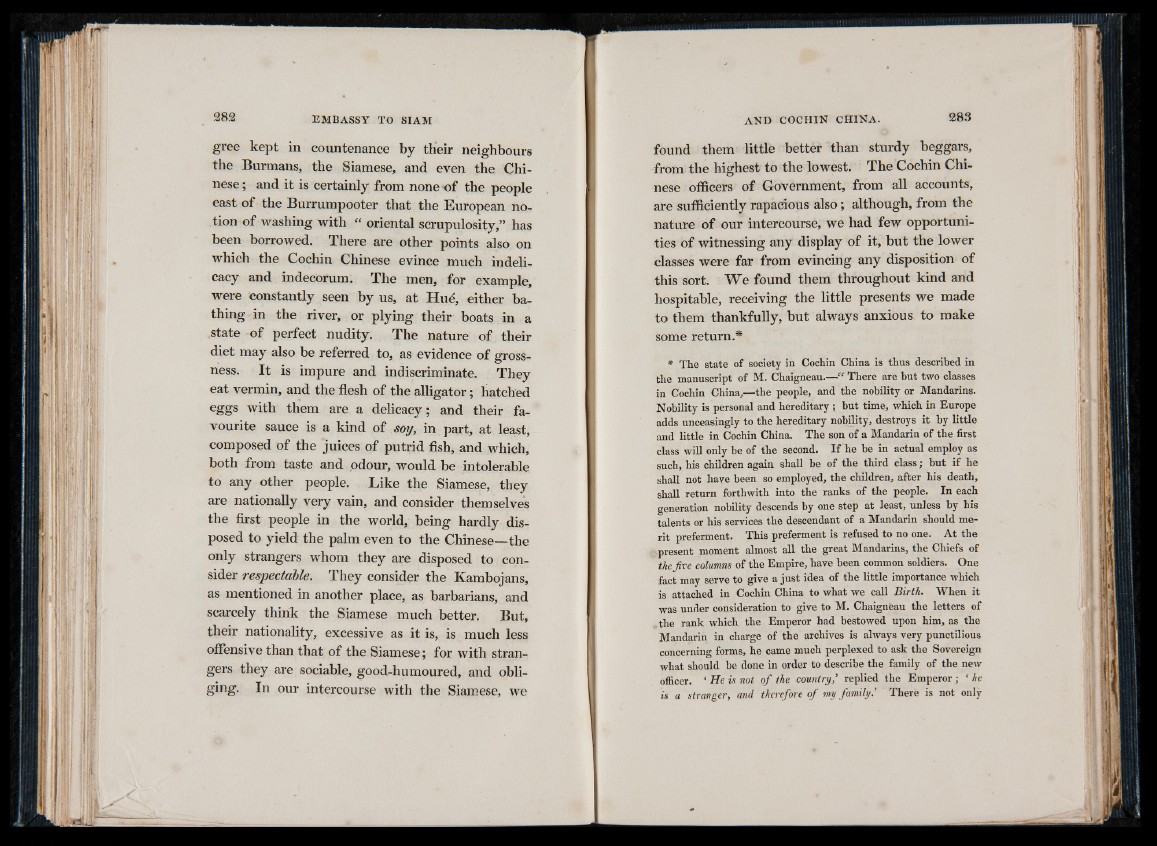
gree kept in countenance by their neighbours
the Burmans, the Siamese, and even the Chinese
; and it is certainly from none of the people
east of the Burrumpooter that the European notion
of washing with “ oriental scrupulosity,” has
been borrowed. There are other points also on
which the Cochin Chinese evince much indelicacy
and indecorum.. The men, for example,
were constantly seen by us, at Hué, either bathing
in the river, or plying their boats in a
state of perfect nudity. The nature of their
diet may also be referred to, as evidence of grossness.
I t is impure and indiscriminate. They
eat vermin, and the flesh of the alligator ; hatched
eggs with thiem are a delicacy ; and their favourite
sauce is a kind of soy, in part, at least,
composed of the juices of putrid fish, and which,
both from taste and odour, would be intolerable
to any other people. Like the Siamese, they
are nationally very vain, and consider themselves
the first people in the world, being hardly disposed
to yield the palm even to the Chinese—the
only strangers whom they are disposed to consider
respectable. They consider the Kambojans,
as mentioned in another place, as barbarians, and
scarcely think the Siamese much better. But,
their nationality, excessive as it is, is much less
offensive than that of the Siamese; for with strangers
they are sociable, good-humoured, and obliging.
In our intercourse with the Siamese, we
found them little better than sturdy beggars,
from the highest to the lowest. The Cochin Chinese
officers of Government, from all accounts,
are sufficiently rapacious also; although, from the
nature of our intercourse, we had few opportunities
of witnessing any display of it, but the lower
classes were far from evincing any disposition of
this sort. We found them throughout kind and
hospitable, receiving the little presents we made
to them thankfully, but always anxious to make
some return.*
* The state of society in Cochin China is thus described in
the manuscript of M. Chaigneau.—“ There are hut two classes
in Cochin China,—the people, and the nobility or Mandarins.
Nobility is personal and hereditary ; but time, which in Europe
adds unceasingly to the hereditary nobility, destroys it by little
and little in Cochin China. The son of a Mandarin of the first
class will only he of the second. I f he be in actual employ as
such, his children again shall be of the third class; but if he
shall not have been so employed, the children, after his death,
shall return forthwith into the ranks of the people. In each
generation nobility descends by one step at least, unless by his
talents or his services the descendant of a Mandarin should merit
preferment. This preferment is refused to no one. At the
. present moment almost all the great Mandarins, the Chiefs of
the Jive columns of the Empire, have been common soldiers. One
fact may serve to give a just idea of the little importance which
is attached in Cochin China to what we call Birth. When it
was under consideration to give to M. Chaigneau the letters of
the rank which the Emperor had bestowed upon him, as the
Mandarin in charge of the archives is always very punctilious
concerning forms, he came much perplexed to ask the Sovereign
what should be done in order to describe the family of the new
officer. ‘ He is not of the country,’ replied the Emperor; * he
is a stranger, and therefore of my family. There is not only